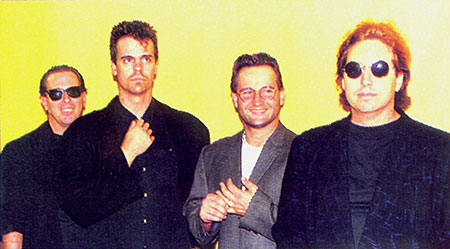Dä The Band That Won't Go Away
CCM Magazine Nov. 1991
by Thom Granger
"And what is my bid for this plastic cup I've been drinking lemonade from?" Somehow, coming from the lips of Terry Taylor, the irony of his tongue-in-cheek query was as delicious as the bittersweet beverage he'd just sucked up. It was a sweltering hot scene at this summers Cornerstone Festival, where the architect of alternative Christian rock was hocking recordings, posters, and other memorabilia from 'the band that won't go away" to an enthusiastic crowd of true believers. For Taylor, da's chief lyricist, singer, and mentor, it had to be more than a little strange.
Through the serious permutations-Daniel Amos, DA, Da and now dä (not to mention solo records and the notorious Swirling Eddies)-Taylor & Co. have been dropped by virtually every label they've signed with; though not before recording at least one significant collection of songs in each instance, all of witch have tended to fetch big bucks in the collectors market. So it had to be a bit weird to make an appearance under this circus-like tent (though maybe that's fitting), where he played a few tracks from the new da album Kalhoun, and sold everything he brought-hence the lemonade-cup opportunity.
Part of the attraction was undoubtedly due to the rarity of the personal appearance. Taylor doesn't go out much into the public arena - a subject he has mixed emotions about. "It's good for me to get outside myself, 'cause I could easily be this eccentric recluse who writes songs and goes to the studio." says Terry, back in his hotel room after the listening party/auction/lovefest. "I mean, you're doing this for people anyway, and I need the shot in the arm, but to be honest, I'm not the kind of person who's comfortable with meeting a lot of people. It does put things back into perspective for me though."
Taylor has to feel a little patriarchal at an event like Cornerstone, which typically draws about 10,000 alternative music fans to the middle of a Midwest cornfield to hear the kinds of music he was being expelled from churches for playing 15 years ago.
"It always makes me feel good to have a group like Dig Hay Zoose, who I've ended up producing, say to me, 'I listened to your records when I was a kid.' And although that could sound like a left-handed compliment, I do believe we created the kind of freedom (for good or ill) that we're seeing today at places like Cornerstone. Look how far a band like One Bad Pig has come, and the kind of support those guys get from a major label. I think we moved the boundaries out musically and lyrically, and I'm real proud of that.
What I've never wanted to become, however, is a dinosaur that says, 'There's my boys out there.' I need to continue to be creative and relevant, like the rest of them; therefore they have their influences on me as well."
And one need look no further than Kalhoun to see that Terry Taylor and the rest of da are still making fresh music for the knife-sharp edge of the alternative envelope. Says Taylor, "I think the new album is a surprise to some people. Everybody perceived the Swirling Eddies as 'zany' or something, and I think the diehard da fans were wanting to see some new material."
Yeah, and just what was the Swirling Eddies about anyway? According to Taylor, "The Darn Floor Big Bite album was a liberating thing for us, but it didn't sell well at all. Here we had finally found a musical voice of our own, and like it or not, no one else could have done that record. The fact that it didn't connect was a real blow to us and our record company. So the Eddies gave us a chance to be zany again without restrictions, though I think the second one (Outdoor Elvis) was more serious than people gave it credit for-more like a da record."
Kalhoun is serious all right, but with the same wicked sense of humor that has proved troublesome in the past for Taylor. "The big problem is that it's seen as cynical. I'm seen as this cynical person who puts everything down and hates the church-a naysayer. But that's because most of the church doesn't understand satire."
True enough (ask the other Taylor-Steve), but for those who need explaining, terry offered his thoughts on the themes of Kalhoun. "The album is like a distant cousin to Shotgun Angel, sort of apocalyptic in nature. Kalhoun is about deception, false religion, and nationalism, which came out of the recent war. The quick victory, the new pride-there are good things about that, but also very dangerous things which I'm concerned about. I think the troops deserved all the parades, but what is this 'new world order' our president is talking about? It's important that we don't see the American way of life and thinking as a religion and worship it as such, because it is ultimately going to fail. That's why Christ needs to set up his kingdom-which will be a perfect one. That's where my hope lies."
